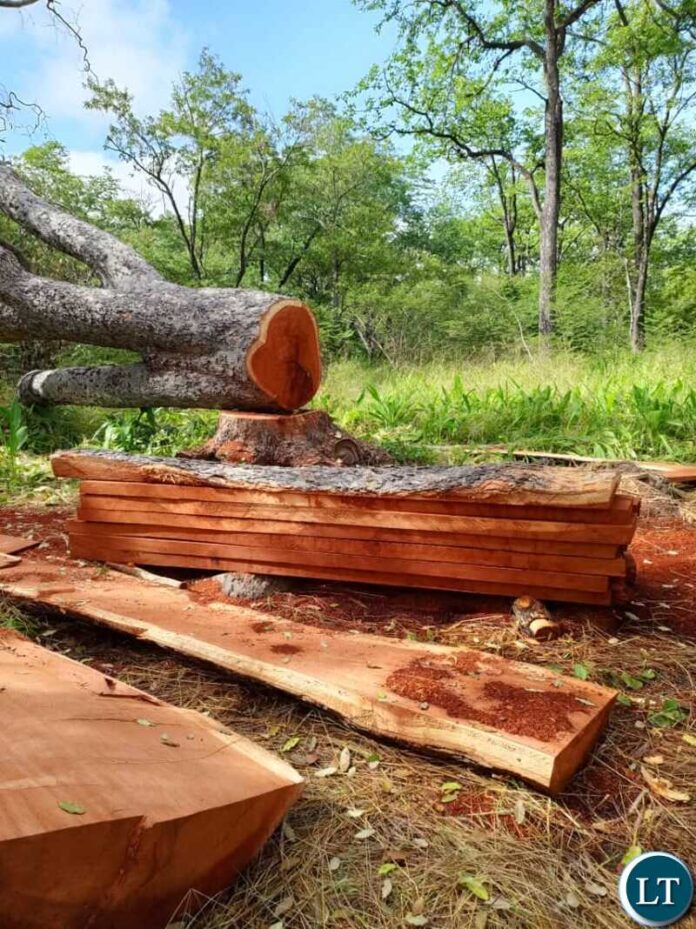Recent incidents in Zambia have brought attention to the significant roles traditional leaders play in the management of natural resources, prompting widespread calls for increased transparency and accountability. While the President bears primary responsibility for overseeing resource management, it is essential to recognize the substantial influence that traditional leaders wield in safeguarding these invaluable resources within their respective domains. However, the emergence of a troubling trend involving certain traditional leaders misusing their authority, particularly in the exploitation of timber and other natural resources, demands immediate and concerted action from society.
A recent report released by the Zambia Police underscores the critical need for enhanced monitoring and supervision of traditional leaders’ activities concerning resource management. The apprehension of Chief Chikwa of the Senga people in Chama District for engaging in unauthorized timber harvesting within a restricted area serves as a poignant illustration of this issue. Deputy Police Public Relations Officer, Danny Mwale, disclosed that Chief Chikwa’s encroachment into the restricted zone led to his arrest by the Central Joint Operation Committee. While Chief Chikwa awaits further legal proceedings subsequent to his release on police bond, this incident deeply reinforces the fundamental principle that every individual, regardless of their societal status, must be held accountable for their actions.
The involvement of traditional leaders in illicit activities related to the timber trade is a matter of grave concern, representing a significant breach of trust within their communities and a detrimental undermining of their authority. Multiple instances have surfaced, indicating the complicity of certain chiefs in unlawful timber trading activities across various regions.
Immediate and decisive measures are imperative to combat the pervasive menace of illegal logging and resource exploitation. Accountability must extend beyond the immediate perpetrators to encompass those who enable or condone such nefarious actions, including traditional leaders. It is imperative to fortify monitoring and enforcement mechanisms comprehensively to avert further degradation of ecologically sensitive areas and game management zones.
In my capacity as the Secretary General of the Forestry Institute of Zambia, I wholeheartedly endorse the urgent call for action against the misuse of authority by traditional leaders. Upholding the principles of transparency, accountability, and sustainability in resource management constitutes a fundamental prerequisite for safeguarding the interests of both present and future generations. Let us seize upon this wake-up call as an opportunity to reaffirm our unwavering commitment to responsible environmental stewardship.
Historical Context: Traditional Leadership and Forest Management
Traditional leaders have traditionally played pivotal roles in forest management throughout Zambia’s history, dating back to the pre-colonial era. Kings, Chiefs, and headmen exercised considerable authority over land and resources, governed by the tenets of customary law. However, the advent of colonial intrusion during the 1900s precipitated a significant diminution in the authority of traditional leaders, culminating in the transfer of forest management control to colonial administrators. Subsequently, in the post-colonial era, Zambia adopted a dual governance model, seeking to harmonize statutory regulations with traditional practices overseen jointly by governmental bodies and traditional leaders.
Governance Expert Criticizes Chief Chikwa’s Arrest
Radio Phoenix has reported the scathing critique issued by Governance Expert Wesley Miyanda regarding the arrest of Chief Chikwa in Chama district for purported timber harvesting within a Game Management Area. Mr. Miyanda contends that administrative recourse should have been pursued, given the Chief’s custodial responsibility over land. He castigates the expeditious arrest of Chief Chikwa compared to the apparent immunity enjoyed by the perpetrators responsible for the despoliation of Lusaka’s Forest 27, insinuating potential political interference.
Chief Chikwa’s apprehension serves as a poignant reminder of the broader governance challenges, particularly concerning the enforcement of environmental statutes and the delineation of traditional leaders’ roles in resource management.
The foregoing discussion underscores the inherent complexity of the issue at hand, wherein divergent perspectives emerge. While one school of thought commends law enforcement for its proactive stance in apprehending a purportedly errant chief, an opposing viewpoint advocates for administrative redress owing to the custodial responsibilities vested in traditional leaders. Nevertheless, the imperative of addressing the misuse of authority by traditional leaders necessitates a collaborative and transparent approach involving all stakeholders, encompassing governmental authorities, citizens, and royal traditional establishments.
By holding individuals accountable and fortifying governance mechanisms, Zambia can safeguard its natural endowments for the prosperity and well-being of future generations.
Lastly, I humbly request and implore His Excellency, President Hikainde Hichilema, and the esteemed House of Chiefs to intervene decisively in this matter, thereby upholding the dignity and integrity of our respected traditional rulers.
Eng Chaliafya Katungula
(Forestry Expert)
Secretary General
Forestry Institute of Zambia



No government official has ever been arrested despite overwhelming evidence against some of them. Serious allegations have been settled ‘administratively’ outside of court or by police. Aren’t the Game Rangers in this area subjects to he same king? The police could have used other non-contentious methods to curb deforestation by working with traditional leaders as co-facilitators instead of antagonising them. In a kingdom, the king is infallible. It is also true that the prime factor was to embarrass King Chikwa, which can never happen to say, the Litunga.
Comments are closed.